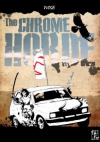
The boy was born on the day when the thunder lizards finally took their revenge. The lights went out across the outskirts of Kvosgol Nuur the moment he drew his first breath, his cries extinguishing the artificial day.
As night fell in a great wave across the cities and slipped through the open windows of houses and through cracks, the only sounds in the world were the lamentations of car horns, the useless cries of the steel-and-glass beasts that lay dormant in rows across the millions of miles of asphalt. In the hospitals, EKGs beeped their final mournful cries in unison, before finally going silent at the break of dawn.
The great factories uttered not a sound, however. Their machines had been left to their own devices and embraced death with quiet acceptance. Their gears simply ceased their grinding, leaving unfinished plastics stuck in their conveyor belts. Amid sea, freighter ships stopped dead, their great hulks abandoning their ceaseless struggle against the ocean. The turbines of jet airliners, realizing that their sustenance had run dry, coughed once, hummed twice and then ceased their endless turning. Like martyrs, they abandoned themselves to their fate, depriving the hundred-ton behemoth they had been propelling in the air to merciless gravity. No thought was spared on the screaming masses that were plunged to the ground inside it.
They fell with the grace of diving falcons, in their thousands. Most crashed into the ocean, compacting like gargantuan springs. First class smashed into business, smashed into economy eliminating all distinction in an instant, sending broken bodies and comfort chairs and showers of peanuts careening through the air. Other planes fell into the wilderness, skidding across the desert or gracelessly smashing into mountains. Only a few landed in cities, bombarding skyscrapers and crushing man and machine alike into pulp.
It was later agreed, by the few scholars produced in the ages that were to come, that those screaming, burning, crushed thousands were actually the lucky ones. They did not, after all, have to suffer through the deprivations that were to follow. They did not waste away from lack of medicine or experience the slow, encroaching death that comes from starvation, as the human body cannibalizes itself for an entire month before finally pulling the plug. Those dead tens of thousands did not have to suffer through the harsh winters that followed, trapped in the steel-girder cubicles that had once constituted their homes. They didn’t find themselves at the mercy of the elements, those fortunate martyrs. Adding insult to injury, they were not the ones who had to gather the massed dead, to dig graves and man the unmarked hecatombs. Nor were they there for the count, when the survivors dug up those very same hecatombs that their kin or themselves had dug, to excavate their remains and cull the rotted flesh, looking for fresh bits to bite into, to quench the fire in their bellies.
After all, those pioneers of the apocalypse- the scholars argued as they sat huddled around the fires of their camps dressed in the tattered three-piece-suits of their ancestors- never had to suffer the cruel medicine of the Chrome Horde.



Emp?